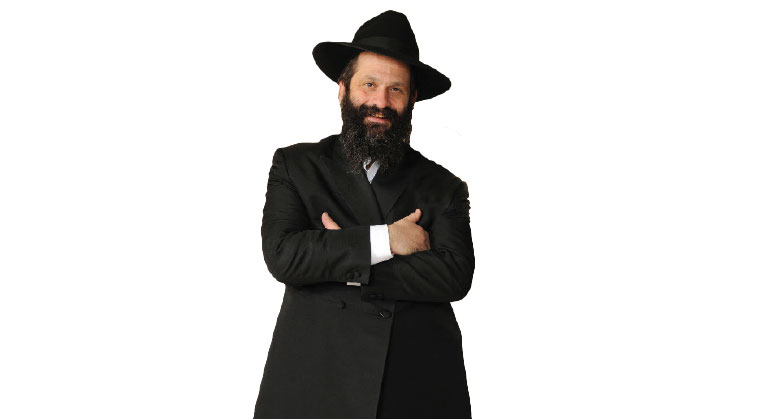One of Us

Jews are holy, and tefillah works

B
y now, you’ve likely heard that Sholom Mordechai Rubashkin has freed an agunah, gotten kids into school, secured pay raises for teachers, found a cure for the common cold, and rescued a kitten from up in a tree.
And you’ve probably heard the grumbling too. Stop lionizing him, it’s too much. Or, the whole thing is a chillul Hashem: He should quietly rejoin his family and remain out of sight.
Assuming the complainer is without sin — i.e. he never didn’t report/declare/admit something, even when he or she stood to gain — and is truly pained, then I’d like to clarify something.
I love Sholom Rubashkin. I watched every clip, listened to every speech, read every update of which rebbe he’d visited. I’m complicit in the Rubashkin-mania and I want to explain why.
Chazal teach us that the esrog represents the tzaddik, who has Torah and good deeds, and the other minim correspond to different sorts of Jews. All four are necessary to perform the mitzvah, to bring glory and pleasure to the One Who commanded us to do mitzvos.
Now, I’ve met tzaddikim. We’ve written about them. There are the esrog types, the exalted ones, those who’ve been closeted in a world of holiness and purity from their earliest years. Walk into the four amos of Rav Chaim Kanievsky or the Skulener Rebbe, for example, and you’ll feel yourself overwhelmed, almost unable to speak: They are tzaddikim.
But there are tzaddikim who are from the world of the other three minim, regular folk with their challenges and ups and downs, the people around us who sometimes get upset over the neighbor grabbing the parking spot and mutter under their breath when the person ahead of them in line at the grocery needs the cashier to scan the frozen gefilte fish three times and check if it’s on sale.
Regular people. About whom it says, “Ve’amech kulam tzaddikim.”
Sholom Mordechai is a tzaddik from that realm. He ran a meat business. By all accounts, a great guy, a warm, generous Yid. He had a heart for meshulachim, a respect for his workers, an appreciation for struggling teenagers — but just a guy, like so many others. I assume he was occasionally late for davening, or lost his temper, or maybe he sometimes made brachos without having proper kavanah.
And then he went to prison, maybe for no reason, maybe for a small reason — and when that happened, he taught us something. He taught us that the butchers of Klal Yisrael have the same capacity for spiritual valor, that a chain-smoking Lubavitcher businessman has the DNA of Avraham, Yitzchak, and Yaakov, too. Remember the blue-and-yellow Machanayim books with rhyming text (“indeed” and “in need” was used at least once in every single book) and illustrations of liquid-eyed heroes walking paths lined with roosters and sheep?
Sholom Mordechai was that kind of hero, one from our world. A Moshke kicked around by the poritz and responding with not just faith, but a certain joy. The baal agalah whose horse dies and he’s dancing next to it, certain that the Divine plan that felled the trusty animal is perfect and just. (Imagine what the animal rights people would do with a kids’ book that talks about a dead horse in such a cavalier way — remember Harambe!)
His story captured us because we recognized ourselves in him, the regular guy not from Bnei Brak or Ribnitz or Nahariya, but from Boro Park; we were swept in as we wondered how he’d react because we wondered how we would react.
When he lay on the floor being beaten because he wouldn’t take off his tzitzis, our spirits soared, because we found out it was true, that regular guys are still holy! They can do it! When he and his wife smiled through the pain, we were mesmerized because we learned that the stuff we’ve been fed and feed our children, the glory within every Yid, is alive and well.
That’s one part.
Part two is that as he sat, with his stubborn faith, rising above the physical discomfort, loneliness, and pain of prison, we also did our part.
Do you know who davened Sholom Mordechai home? The regular folk. The women with their challah-baking and the kids with their brachos parties. When we were at the Kosel or in Meron, when we happened to have a good Shemoneh Esreh and felt like the words and emotions were flowing, we remembered him.
And after years of bitachon and years of tefillah, a neis happened.
Maybe one day the full story of the series of events will be told, maybe not, but it’s certainly a neis, probably even an open neis.
And suddenly, there was a “pischon peh lameyachalim lach,” a great surge of encouragement to those who’d been hoping all along. Suddenly, we were able to read bedtime stories to our children (not the blue-and-yellow ones — alas, my children, nebach, read comics. Instead of losing the inn or the cow, the good guys are faced with nuclear disaster and anthrax) and know, with certainty, that the lessons are true.
The torrent of euphoria isn’t even about Sholom Mordechai, but about us: Jews are holy, and tefillah works.
And so, if within the rejoicing you see chillul Hashem and can’t get past it, go read one of those old-time children’s books. Maybe it’ll irk you that Moshke was late with the rent and you’ll think the poritz was justified in throwing him into a pit with no food — but maybe you’ll remember how we once looked at things, back when we used to read those stories. Back when we weren’t so smart.
Originally featured in Mishpacha, Issue 692. Yisroel Besser may be contacted directly at besser@mishpacha.com
Oops! We could not locate your form.








